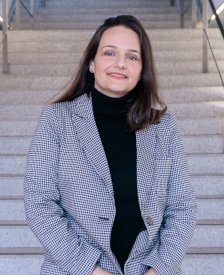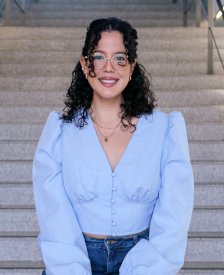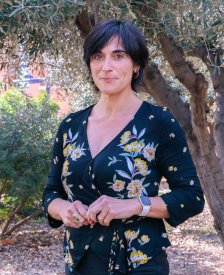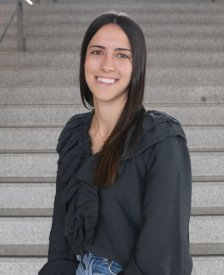Master in English Language and Literature and their Artistic and Cultural Expressions (MELART)
Master

Mixed Classroom
Based
From 03/10/2022
to 08/03/2023
60 Credits
Registration
information
1056€
INTRODUCTION
MELART has been created to respond to a series of needs and knowledge spaces that contribute to the training of graduates in English Studies or people with similar profiles. The main objective is to review and further explore aspects that establish connections between linguistic, literary, artistic and cultural expressions in English, thereby contributing to the education not only of people interested in receiving training in the area, but also of practising teachers and professionals who will update their knowledge and have access to materials that they will be able to implement in their professional field.
TARGET GROUP
- Graduates in English Studies.
- Other graduates interested in completing their training in literary and cultural aspects in English and who have at least a C1 level (CEFR) in this language.
- Final year students with an interest in the implementation of organisational coaching, and who have fewer than 30 ECTS credits left to complete their degree. *Note: these students will not be eligible for any certificate or the issuing of the UJI-specific degree until the corresponding qualification has been obtained.
- Professionals working in the sector who don't hold a university degree but can prove they have sufficient professional experience as managers or employees in companies or institutions linked to the field of study.
GENERAL INFORMATION
Duration: one academic year / 60 ECTS credits
Mode of study: hybrid
Dates: from October 2022 to March 2023.
Days and hours: Monday and Wednesday 16.00–20.00
Place: FUE-UJI. Board of Trustees building. Campus del Riu Sec Castelló de la Plana. (see map)
Qualification awarded: UJI-specific master’s degree
Check out our special fee for members of Alumni SAUJI Premium!
AIMS
- To respond to the need to complement the state-regulated studies of the Bachelor's Degree in English Studies and to satisfy the social demand to expand knowledge on and delve deeper into the literary, artistic and cultural aspects of the English language
- To offer the chance of greater specialisation in the field of literary, artistic and cultural studies in the English language in order to attract students interested in writing doctoral theses related to these subjects to the Doctoral Programme in Applied Languages, Literature and Translation
- To enrich the training offered through the master’s degree courses the Universitat Jaume I (in line with the guidelines set out in ECOPOL: Strategy to promote the coexistence and use of languages)
- To strategically position the UJI in the international university framework by attracting students from outside our immediate setting; the fact that it is a hybrid or blended learning course together with the use of English as the language of instruction are determining factors in this sense
- To come into line with the fundamental criteria that define the New Humanities thereby promoting a pedagogy based on interpersonal intellectual engagement, developing critical and creative thinking skills, identifying ethical issues, critical analysis of cultural productions and discourses, understanding international communities and our role within the global landscape, and seeking to develop the capacity to think about our collective future in a flexible manner
- To develop content that is compatible with the Sustainable Development Goals (SDG 4, 5, 13 and 16): i.e. reduction in inequalities through inclusive (in terms of gender and functional diversity) and high quality education, and access to lifelong learning; increased awareness regarding environmental issues, etc.
- To promote cross-disciplinary skills and core competences among students so that they can use them to address the SDG, namely, critical thinking, self-awareness, integrated problem solving and anticipatory skills, strategic and collaborative skills; learning skills, creative thinking, social responsibility, and the ability to work in interdisciplinary settings
METHODOLOGY
The master’s degree course, which is delivered in a blended (hybrid) learning format, will be structured on the basis of theoretical-practical sessions that will combine the introduction of key concepts and the analysis of texts by the teachers, who will act as learning facilitators, and seminars in which the active participation of the students through debates will be fundamental for the construction of knowledge. Thus, a schedule of face-to-face sessions will be planned, ensuring there is sufficient time between them to allow students to carry out a detailed reading and analysis of the texts or materials that make up the syllabus.
ASSESSMENT CRITERIA
In general terms, assessment will take into account attendance and active participation in the sessions and will be carried out through oral presentations, written academic assignments, or other tools the teacher deems appropriate and will communicate to the students through the established channels.
Given that a C1 level in English is a minimum requirement for admission and entry to this master’s degree course, the level of language used in the oral presentation and in the written assignments will obviously have an impact on the final mark. In fact, if the English used in the oral presentation and written assignments contains phonetic, syntactic, grammatical or spelling mistakes that actually affect and hinder the understanding of the intended message, the student will fail the module.
COURSE CONTENTS
The different subjects covered in the modules are distributed over the two semesters, with the weight of these subjects being somewhat greater in the first semester, in order to facilitate the completion of the Master's Thesis, which usually requires more dedication in the middle and final stages.
Each module will introduce concepts that relate English language and literature to English culture and its expression through art.
The master’s degree course is made up of the following modules:
- CREATIVE WRITING: The fundamental elements surrounding the creative writing process will be revealed to students: initial reflection on the plot, organisation of the narrative structure, description of the space-time context, selection of the viewpoint, characterisation of the different individual roles, etc.
- MEDIAEVAL LITERATURE AND ITS ARTISTIC EXPRESSIONS: FROM NARRATIVE TO ART: Students analyse the artistic expressions derived from the representations of mediaeval English works, in particular those that still remain in the collective memory and are relevant in the different visual arts and literary genres, with special attention to the Arthurian themes and Tolkien's literary universe. A general review of mediaeval literature is proposed in order to understand its narrative scope in the field of art and its different manifestations.
- YOUNG ADULT LITERATURE IN THE 20th and 21ST CENTURY: Unlike what happens the English-speaking world, English-language literature for young people has always occupied a marginal place in the field of English Studies in Spain. This module aims to combine the theoretical and literary study of philology with its practical application in the field of education. Thus, a representative sample of texts for young people from the 20th and 21st centuries will be analysed from a literary, philosophical and social perspective.
- GRAPHIC NOVELS AS TOOLS FOR SOCIAL ACTION: The module presents key ideas in graphic novels as tools for social action. Issues related to Sustainable Development Goals (SDG) such as high quality education, gender equality, economic growth, environmental issues and reducing inequalities will be addressed (i.e. functional diversity and medical conditions).
- FROM LITERATURE TO FILM AND BEYOND: BUILDING THE EUROPEAN IMAGINARY THROUGH FILM ADAPTATIONS OF ENGLISH LITERARY CLASSICS: This module explores the interaction of literature and film through film adaptations of canonical English literature. The module analyses the construction of the post-war (post-1945) European imaginary and the modern aesthetic canon through cinema's cultural rewriting of classical English literature.
- EMOTIONS AND HUMOUR IN THE AMERICAN CULTURAL SCENE: POETRY, PLAYS, CINEMA AND ART: Humour is considered a subversive tool in artistic production in a number of fields such as poetry, music, theatre, film and art, which allows us to address controversies and dialogue with different points of view, thus showing the richness and diversity of American culture. The reading, analysis and commentary of different artistic productions from the 1970s to the present day will be addressed.
- TRANSLATION, ADAPTATION AND APPROPRIATION IN THE ERA OF GLOBALISATION: While focusing on cultural and artistic manifestations in the English language, the module will try to emphasise the need to understand any artistic and cultural manifestation from a global point of view. Concepts such as translation, adaptation and appropriation will be addressed in this context, and will be applied not only to literary works, but also to those of an audiovisual, theatrical and musical nature.
- COGNITIVE SEMANTICS: This module will deal with the relationship between experience, the conceptual system and the semantic structure expressed by language in discourse. Students will be introduced to key concepts for literary studies such as cognitive modelling in figurative language, metaphorical variation and creativity, and frames in text and discourse
- FIGURATIVE LANGUAGE IN THE CONSTRUCTION OF FICTIVE AND REAL WORLDS: This module introduces key notions in the use of figurative language that have recently proved to be effective tools in the analysis of various communicative functions and effects in various types of genre and discourse, especially in literary discourse.
Schedule
MASTER'S DEGREE COORDINATORS
María José Esteve Ramos
Elena María Ortells Montón
UNIVERSITAT JAUME I TEACHING STAFF
Santiago Posteguillo Gómez
Senior lecturer UJI (Dept. of English Studies) / 3 credits
María José Esteve Ramos
Senior lecturer UJI (Dept. of English Studies) / 6 credits
Elena Ortells Montón
Senior lecturer UJI (Dept. of English Studies) / 1.5 credits
Ignasi Navarro Ferrando
Senior lecturer UJI (Dept. of English Studies) / 3 credits
Senior lecturer UJI (Dept. of English Studies) / 6 credits
Senior lecturer UJI (Dept. of English Studies) / 6 credits
Nieves Alberola Crespo
Senior lecturer UJI (Dept. of English Studies) / 6 credits
José Ramón Prado Pérez
Senior lecturer UJI (Dept. of English Studies) / 4.5 credits
Manel Bellmunt Serrano
Postdoctoral Assistant Lecturer UJI (Dept. of English Studies) / 6 credits
Elena Míriam Dobre
Predoctoral trainee staff (Dept. of English Studies) / 1.5 credits
Lidón Prades Yerves
Predoctoral trainee UJI staff (Dept. of English Studies) / 1.5 credits
Montserrat Esbrí Blasco
Adjunct lecturer UJI (Dept. of English Studies) / 1.5 credits
Melania Rodríguez Román
Adjunct lecturer UJI (Dept. of English Studies) / 1.5 credits
EXTERNAL TEACHING STAFF
Francisco José Ruiz de Mendoza Ibáñez
FULL PROFESSOR. Professor Ruiz de Mendoza is a full professor with an extensive and recognised teach and research career. He has led six national research projects and has supervised 15 doctoral theses. He heads the international research group Lexicom, and his CV includes more than 160 articles published in prestigious journals. He has also co-edited 8 books and authored 7 others and has been invited to present his research on numerous occasions at universities around the world.
Adriana Taboada González
INTERIM CONTRACT LECTURER. Professor Adriana Taboada currently teaches and researches at the University of Vigo. As an expert on Tolkien's literature, she has undertaken several stays, including one as a guest at Oxford University, working with Stuart Lee, one of the most renowned specialists in this author. Her field of specialisation is highly relevant to the module, as she is one of the most important specialists in the analysis of the visual and artistic elements of the author, a subject she has dealt with in a number of publications in renowned journals and publishing houses.
COLLABORATING LECTURERS
The master’s degree course also features collaborators of recognised repute, who will bring an additional degree of experience and internationalisation to the programme. Among them will be Professor Jeremy J. Smith (University of Glasgow), Emma Nudding (University of York) or, at the national level, professor Jorge Luis Bueno, of the University of Vigo. A number of professionals from different fields of art will also collaborate.
*Note: The teaching staff of the course is subject to changes.
INFORMATION ABOUT REGISTRATION
REGISTRATION FEES
€1056 (€300 to reserve a place + €756 remaining registration fees)
Special rate for SAUJI Premium members. To qualify for this rate, please select it when you register. Check requirements and conditions
DOCUMENTATION TO BE SUBMITTED
- 1 photocopy of your degree certificate
- 1 photocopy of your Spanish ID card (NIE or passport in the case of foreign students
- Proof of payment of the €300 deposit made to reserve your place
- Bank account number for payment by direct debit
METHODS OF PAYMENT
Students wishing to enrol on this master's degree course must pay the €300 required to reserve a place on the course into the account below and fill in the "Registration Form".
Account no.: ES64- 2100-4236-14-2200003795 (Bank: La Caixa)
Payment of the remaining registration fees
1. Direct deposit/bank transfer: Account number: ES64-2100-4236-14-2200003795 (Bank: La Caixa)
2. Direct debit: Together with the documents that are required for registration, you must also provide a bank account number so that direct debit payment can be made at the beginning of the course.
3. Personalised sources of financing are available
The workload of university master’s degrees is between 60 and 120 European credits (one or two academic years) and must have official accreditation from the Spanish Ministry of Education. They are recognised throughout the European Union without any further formalities, so they allow for mobility between countries
UJI-specific master’s degrees accredit a university training cycle at postgraduate, non-doctoral level. They comprise a minimum of 60 credits
At Fundación Universitat Jaume I-Empresa
Departamento de Formación - Silvia Membrilla
Edificio Consejo Social.
Campus Riu Sec. Universitat Jaume I.
12071 Castellón de la Plana.
Teléfono: (+34) 964 387 209/22. formacion@fue.uji.es
Pre-registration and registration take place in June/July (first period) or September/October (second period). Pre-registration can be completed online from the section under that name on each course’s website. For registration, you must submit the documents required and make the payment for the course
In addition to the application for admission, you must submit two copies of your degree certificate; transcript of records; CV; two photos; two copies of your ID document (DNI, NIE or passport); proof of payment of the reservation fee (€ 300). Documents can be submitted in person at the FUE offices or sent by e-mail to formacion@fue.uji.es.
If your qualification has not been officially recognised by the Spanish government, the decision on admission is up to the course director(s).
All face-to-face master’s courses take place in the Board of Trustees building of the Universitat Jaume I, on the Riu Sec Campus
Full payment must be made before the start of the course. The admission fee must be paid at the time of pre-registration.
Yes, class attendance is compulsory and will be monitored at the beginning of each class. Students are allowed to miss up to 20% of the face-to-face hours taught in the course
This will be left to the course directors’ discretion. In general, undergraduate students who have fewer than 30 ECTS credits left to complete their degree (including the Bachelor’s Thesis) are eligible for admission. However, those students will not be issued any certificates or be awarded the master’s degree until they obtain their undergraduate degree
Professionals from the sector who do not hold a university degree are eligible for admission if they accredit sufficient professional experience (at least three years) as managers or employees at companies or institutions related to the field of study
Yes, the Master’s Thesis is part of the programme and the final subject you must complete in order to obtain the Master’s Degree
Yes, as long as it is contemplated in the course curriculum. Work placements tend to be an additional training supplement to academic contents, so it is not always necessary for students enrolled on a programme to undertake one.
Subject credits are based on the European Credit Transfer System (ECTS). They are used to measure the workload of university studies. One ECTS credit corresponds to 25 hours of work.
Depending on each master’s course, you may be offered the possibility of taking up a subject you have not passed at the first attempt. At the beginning of each master’s course, you will be informed about the assessment tests that there will be in the academic year. You must pass all the subjects of the course in order to obtain the degree.
It is an online platform where you can find all the material needed to study the course and which can be accessed throughout the academic year with the username you will be given once you have registered.
Official certificates for UJI-specific degree are issued by the Rector of the Universitat Jaume I.
The fees for issuance of the degree certificate, through which the Universitat Jaume I accredits completion of the course, are not covered by the registration fee
If you wish to cancel your registration, you have the option of requesting your withdrawal by communicating it 10 calendar days before the start of the course. You can do so by sending an email to formacion@fue.uji.es with the subject CANCELLATION REQUEST
If you do not cancel registration or do so in less than 10 calendar days, the amount of the training will not be refunded. The organization reserves the right to cancel or change the date of the activity. In the event of cancellation of the activity, the registration fee will be refunded.
FUE-UJI Trustees
companies and entities
Contact with us
we help you find what you need

Silvia Membrilla
Phone: 964 38 72 09
WhatsApp: 648126119
formacion@fue.uji.es

Andrea Navarro
Phone: 964 38 72 12
WhatsApp: 648126119
formacion@fue.uji.es

Reyes Riera
Phone: 964 38 72 10
formacion@fue.uji.es

Carmen Guía
Phone: 964 38 72 16
formacion@fue.uji.es

Eva Querol
Phone: 964 38 72 40
formacion@fue.uji.es
Access
Home
La Fundación
R & D & I
Trainning
Conferences
Work Placements
Graduate Scholarships
EuroFUE-UJI
Most visited
FUE-UJI Courses
Extracurricular internship vacancies
Scholarships for graduates vacancies
European and International Projects EuroFUE-UJI
Upcoming Conferences, Seminars and Congresses
Other foundation Websites
Universitat Jaume I–Business Foundation (FUE-UJI) CIF: G-12366993







































